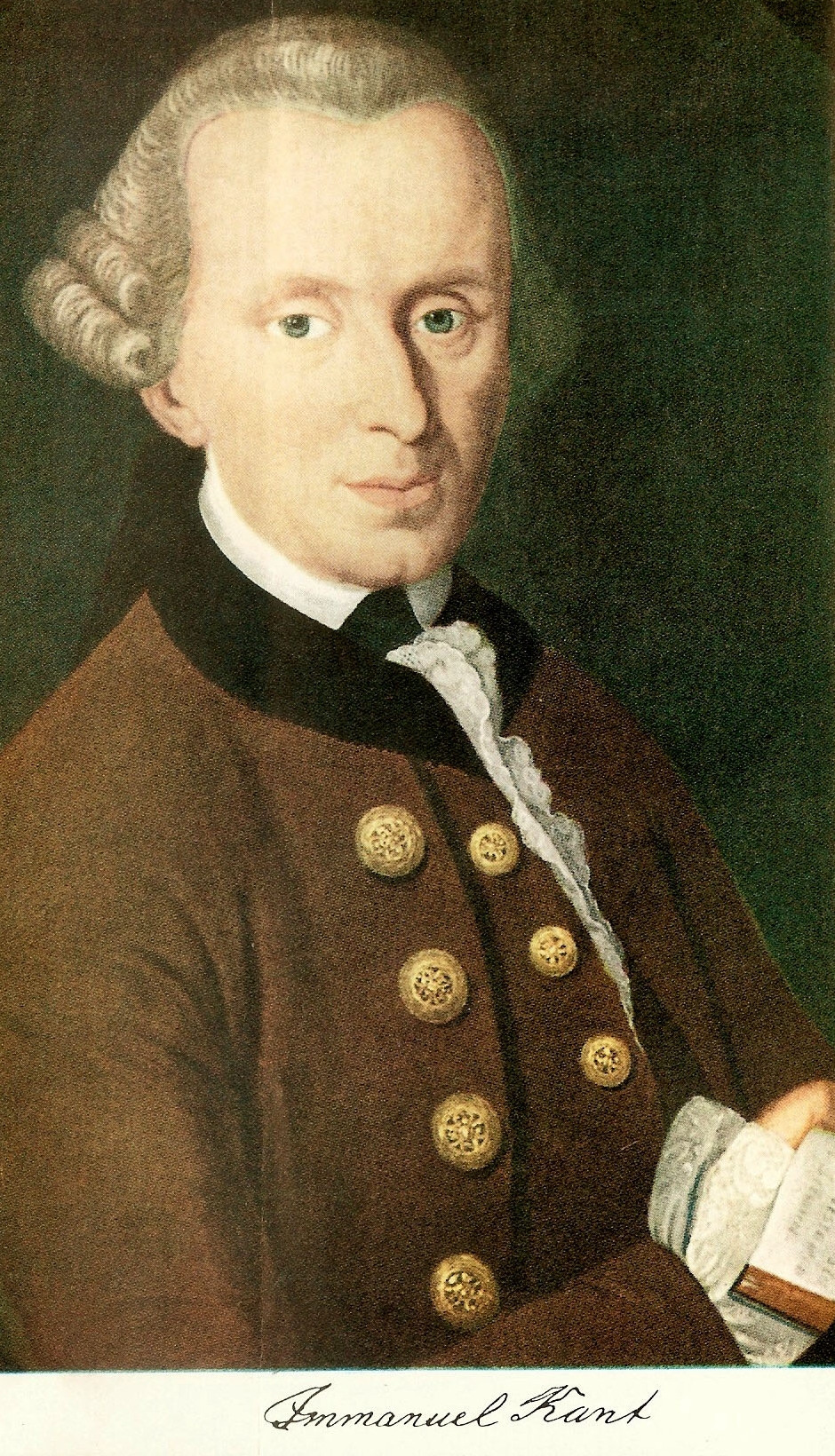Immanuel Kant słynne cytaty
„Moralną koniecznością jest zakładać istnienie Boga.”
Źródło: Jostein Gaarder, Świat Zofii. Cudowna podróż w głąb historii filozofii, tłum. Iwona Zimnicka, Warszawa 1995, s. 356.
„Zaletą literatury jest to, że pozwala ludziom postawić się na miejscu innych.”
Źródło: Adam Żółtowski, Filozofia Kanta, 1923.
„Zawsze masz traktować człowieka jako cel sam w sobie, a nie tylko środek do celu.”
imperatyw kategoryczny.
Źródło: Jostein Gaarder, Świat Zofii. Cudowna podróż w głąb historii filozofii, tłum. Iwona Zimnicka, Warszawa 1995, s. 359.
Immanuel Kant cytaty
Zwei Dinge erfüllen das Gemüt mit immer neuer und zunehmender Bewunderung und Ehrfurcht, je öfter und anhaltender sich das Nachdenken damit beschäftigt: Der bestirnte Himmel über mir, und das moralische Gesetz in mir. (niem.)
Inna wersja: Są dwie rzeczy, które napełniają duszę podziwem i czcią, niebo gwiaździste nade mną, prawo moralne we mnie. Są to dla mnie dowody, że jest Bóg nade mną i Bóg we mnie.
Źródło: O dwóch rzeczach, które napełniają duszę podziwem
Inne tłumaczenie: Istnieje tylko jeden imperatyw kategoryczny: postępuj tylko wedle takiej maksymy, co do której możesz zarazem chcieć, żeby stała się powszechnym prawem.
imperatyw kategoryczny.
Źródło: Jostein Gaarder, Świat Zofii. Cudowna podróż w głąb historii filozofii, tłum. Iwona Zimnicka, Warszawa 1995, s. 359.
Źródło: Spór fakultetów, tłum. Mirosław Żelazny, Wydawnictwo Rolewski, Toruń 2003, s. 136–137.
Źródło: Z. Kuderowicz, Kant, s. 53.
Der Himmel hat den Menschen als Gegengewicht gegen die vielen Mühseligkeiten (des Lebens) drei Dinge gegeben: Die Hoffnung, den Schlaf und das Lachen. (niem.)
„Matematyka jest warunkiem wszelkiego dokładnego poznania.”
Mathematik ist eine Bedingung aller exakten Erkenntnis. (niem.)
„W każdej nauce jest tyle prawdy, ile jest w niej matematyki.”
Źródło: Leksykon złotych myśli, wybór Krzysztof Nowak, Warszawa 1998.
Źródło: Allgemeine Naturgeschichte und Theorie des Himmels
Źródło: Antropologia w ujęciu pragmatycznym, Warszawa 2005
Źródło: Uzasadnienie metafizyki moralności
Źródło: O wiecznym pokoju, tłum. Feliks Przybylak, Wrocław 1995.
Źródło: Richard H. Popkin, Avrum Stroll, Filozofia, tłum. Jan Karłowski, Norbert Leśniewski, Andrzej Przyłębski, Poznań 1994, s. 67.
Źródło: Adam Hlebowicz, Kaliningrad bez wizy, Oskar, Gdańsk 2012, ISBN 978-83-63709-17-4, s. 86.
Immanuel Kant: Cytaty po angielsku
Book IV, Part 1
Religion within the Limits of Reason Alone (1793)
Groundwork of the Metaphysics of Morals (1785)
A lecture at Königsberg (1775), as quoted in A New Dictionary of Quotations on Historical Principles from Ancient and Modern Sources (1946) by H. L. Mencken, p. 1043
“I have therefore found it necessary to deny knowledge in order to make room for faith.”
Źródło: Critique of Pure Reason (1781; 1787)
In the meantime, this little is something which mathematics indispensably requires in its application to natural science, which, inasmuch as it must here necessarily borrow from metaphysics, need not be ashamed to allow itself to be seen in company with the latter.
Preface, Tr. Bax (1883) citing Isaac Newton's Principia
Metaphysical Foundations of Natural Science (1786)
Fourth Thesis
Idea for a Universal History from a Cosmopolitan Point of View (1784)
Kant's Inaugural Dissertation (1770), Section V On The Method Respecting The Sensuous And The Intellectual In Metaphysics
Kant's Inaugural Dissertation (1770), Section V On The Method Respecting The Sensuous And The Intellectual In Metaphysics
Kant's Inaugural Dissertation (1770), Section V On The Method Respecting The Sensuous And The Intellectual In Metaphysics
Kant's Inaugural Dissertation (1770), Section V On The Method Respecting The Sensuous And The Intellectual In Metaphysics
“A spurious axiom of the first class is: Whatever is, is somewhere and sometime.”
Kant's Inaugural Dissertation (1770), Section V On The Method Respecting The Sensuous And The Intellectual In Metaphysics
Kant's Inaugural Dissertation (1770), Section V On The Method Respecting The Sensuous And The Intellectual In Metaphysics
Kant's Inaugural Dissertation (1770), Section V On The Method Respecting The Sensuous And The Intellectual In Metaphysics
Kant's Inaugural Dissertation (1770), Section IV On The Principle Of The Form Of The Intelligible World
Kant's Inaugural Dissertation (1770), Section IV On The Principle Of The Form Of The Intelligible World
Kant's Inaugural Dissertation (1770), Section IV On The Principle Of The Form Of The Intelligible World
Kant's Inaugural Dissertation (1770), Section IV On The Principle Of The Form Of The Intelligible World
Kant's Inaugural Dissertation (1770), Section IV On The Principle Of The Form Of The Intelligible World
Kant's Inaugural Dissertation (1770), Section III On The Principles Of The Form Of The Sensible World
Kant's Inaugural Dissertation (1770), Section III On The Principles Of The Form Of The Sensible World
Kant's Inaugural Dissertation (1770), Section III On The Principles Of The Form Of The Sensible World
“The concept of space is not abstracted from external sensations.”
Kant's Inaugural Dissertation (1770), Section III On The Principles Of The Form Of The Sensible World
Kant's Inaugural Dissertation (1770), Section III On The Principles Of The Form Of The Sensible World
Kant's Inaugural Dissertation (1770), Section III On The Principles Of The Form Of The Sensible World
Kant's Inaugural Dissertation (1770), Section II On The Distinction Between The Sensible And The Intelligible Generally
Kant's Inaugural Dissertation (1770), Section II On The Distinction Between The Sensible And The Intelligible Generally
Kant's Inaugural Dissertation (1770), Section II On The Distinction Between The Sensible And The Intelligible Generally
Kant's Inaugural Dissertation (1770), Section II On The Distinction Between The Sensible And The Intelligible Generally
Kant's Inaugural Dissertation (1770), Section I On The Idea Of A World In General
Kant's Inaugural Dissertation (1770), Section I On The Idea Of A World In General
